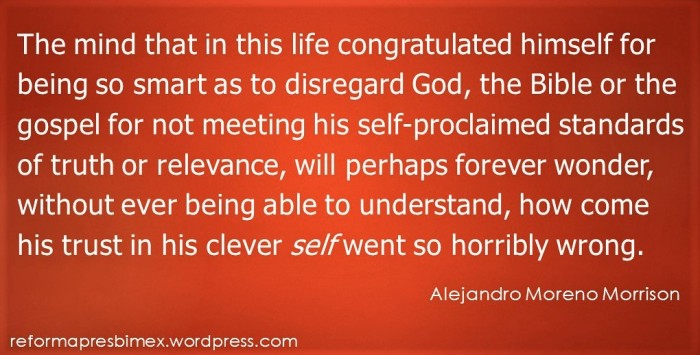By Alejandro Moreno Morrison.
I often wonder whether unbelievers will eventually know, not merely that they were wrong, but how foolish, how irrational, they were in disregarding God, the Bible, or the gospel of salvation by grace alone. Will unbelievers get proper knowledge, understanding, and clarity of mind to realise not merely that they were wrong but how irrational, how foolish, was their unbelief? I don’t know the answer for sure, and it is actually not that important to know. Still, I have thought about two possible scenarios.
I have to confess that more often than not, I want Christian believers to be fully vindicated in the eyes of those who disregard the gospel. I want the unbeliever to know and understand clearly, at some point at long last, that all along, while the Christian in his life held the truth, the unbeliever wilfully dismissed it and stubbornly committed to irrationality and lies. Nevertheless, there seems to be no explicit support in Scripture for this scenario.
There is another possibility. The Bible teaches that at the consummation of times, “when the perfect comes,” the redeemed ones will somehow «fully know» as they were «fully known» by God (1 Corinthians 13:9-12). Therefore, knowing fully, in a superior way, reversing completely the noetics effects of sins, will be part of the glorification yet to come for the redeemed ones. No more doubts, no more misunderstandings, no more ignorance, no more partial knowledge, no more guessing, no more confusion, but full clarity of mind, full assurance, full knowledge of what is true, and full understanding of that truth. That blissful situation will be, of course, yet another undeserved gift of God’s loving grace reserved exclusively for those redeemed by grace alone through saving faith alone in Christ alone.
The aforesaid being a gift that results from glorification suggests that the unregenerate will never attain much more beyond what they had in this life in terms of knowledge, understanding, and clarity of mind on spiritual and eternal matters. They will certainly realise they were completely wrong in dismissing the true God, the Bible, and the true gospel; but will they fully know and understand why? They will have some knowledge of the truth, but it does not seem the noetic effects of sin that fetter human understanding will be reversed for them. Thus, in addition to total alienation from God and from the rest of the creation, the sufferings of eternal damnation will perhaps involve also staying forever in a state of confusion, alienated from full truth, knowledge, understanding and clarity of mind (cf. Daniel 12:2), with a thirst to understand whatever happened to them yet never being able to quench that thirst.
The mind that in this life congratulated himself for being so smart as to disregard God, the Bible, or the gospel for not meeting his self-proclaimed standards of truth or relevance, will perhaps forever wonder, without ever being able to understand, how come his trust in his clever self went so horribly wrong.

Which will you have at the end and forever, full knowledge or perpetual confusion?
____________
Alejandro Moreno Morrison is a Mexican lawyer and Reformed theologian. He studied at Escuela Libre de Derecho (Mexico City), Reformed Theological Seminary (Orlando, Florida), and the University of Oxford. At Reformed Theological Seminary he was a teaching assistant of the Rev. Dr. Ronald H. Nash. He was also a Spanish resources consultant for the Rev. Dr. Richard L. Pratt at Third Millennium Ministries. Alejandro has ministered as an intern, teacher, or visiting preacher or teacher at churches and missions of several denominations including Iglesia Presbiteriana Reformada de México, Iglesia Nacional Presbiteriana de México, Iglesia Nacional Presbiteriana Conservadora de México, Iglesia Presbiteriana Ortodoxa Reformada, the Presbyterian Church in America, the Presbyterian Church of Ireland, and the Reformed Presbyterian Church, North America Synod. With the latter, he was in charge of a mission congregation in 2014. He has also been a guest lecturer on Systematic Theology, Ethics, Evangelism, and Apologetics at Seminario Teológico Reformado of Iglesia Presbiteriana Reformada de México, on Contemporary Political Systems at the Faculty of Law of Universidad Nacional Autónoma de México, and on Corporate law at the Massachusetts Institute of Technologies (Global Startup Lab for Mexico). Since 2010 he is an adjunct lecturer on Jurisprudence at Escuela Libre de Derecho.